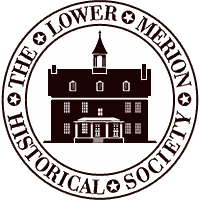A Meeting With Colonial Quakers
By David Schmidt
Main Line Life
originally published November 20, 2002
For local Quakers,the National ParkService’s presentationof history atIndependencePark doesn’t properlyreflect the role ofQuakers in America. “It’slike history started withthe Declaration of Independence,”said Alice Hoffman, a MainLine Quaker historian. “Theycompletely ignore America’s Colonial period.”
So she, as well as other members of twoof the oldest Quaker Meetings in America,decided to do something about that.Naturally that something didn’t include afight with the National Park Service.
They decided to put together a tour,which would entertain as well as educatepeople about Quakerism and its history inAmerica. Recently the two Quaker groups,one from Merion Meeting and the otherfrom the Old Haverford Meeting, combinedto create a memorable tour.
“Alice Hoffman called and asked if I’dconsult on this idea they had. The tour is anexperiment, and they are applying for fundingto do this tour twice a year,” saidArdmore resident Peggy Morscheck, directorof the Quaker Information Center inPhiladelphia.
“This tour is going to provide a microcosmicview of Colonial Pennsylvania thatyou’d find almost anywhere in easternPennsylvania, Delaware or southern NewJersey,” she said. Plans are set for anothertour May 20.
“It’s a challenge for Quakers to deal withthe fact that the Independence Park’s charteris for after the Declaration ofIndependence,” Morscheck said. “The earlyPennsylvanians were a pacifist colony, andwhat they did was remarkable.”
Their problem with the federal programis that because its purview begins with theAmerican Revolution, it emphasizes the”Free” Quakers. These were Quakers whoeither chose or were forced to leave a meetingbecause of their desire tofight in the revolution.
“They emphasizetheQuakers whochose tofight,ratherthan themajorityof Quakers who stood by their belief inpacifism,” Hoffman added.
So the two groups developed a tour thatwould feature Colonial Quaker life and alsoexplain some of the concepts of Quakerthought.
The tour began with a walk through theMerion Meeting’s graveyard, one of the oldestin Pennsylvania, on MontgomeryAvenue. Then the group of about 37 visitorsattended a Quaker wedding. It was anabbreviated version of a wedding that tookplace between bride Lowry Jones andgroom Robert Lloyd in 1698 in a meetingfor worship at the Merion Meetinghouse.
The only difference was that “WilliamPenn” attended the modern version.
Members of the Merion Meeting playedthe historical characters. Will and SarahRoth portrayed the young couple being married.Elders for the wedding sat on facingbenches. Included were John Wynn,Margaret Wynn, James Pettyjohn, AliceHoffman, Anne Holsclaw and Ysabella Watt(representing themselves).
William Penn was played by NelsonCamp, drama teacher at the George Schoolin Newtown. He attended Old HaverfordMeeting until his family moved away whenhe was 8, so he’s familiar with the meetinghouse.
“They asked me if I would portrayWilliam Penn, and I agreed,” he said. “I’vedone re-enactments before, playingWilliam Hicks, the artist who painted”Peaceable Kingdom.’ ”
His presentation was writtenby Old Haverford memberBerenice Hess. The 92-yearoldplanned Penn’s modernvisit to the Old HaverfordMeetinghouse.
But before that,he read the certificateat the MerionMeeting wedding,or as it was said byYsabella Watt,”Friend WilliamPenn will read themarriage certificatelater to be signed by allpresent.” After that, the couple, havingdeclared their fidelity to each other, satsilently until they, or others, were moved tospeak.
According to Watt, this wedding was littledifferent from a recent one.
“The wedding last week was very similarto this Colonial re-enactment,” she said.”There were 15 to 20 Quakers, and the restof the 250 guests weren’t.”
Now, as in Colonial times, the couplewould declare to themeeting their intentionto marry. A period oftime would pass duringwhich the members ofthe meeting would considerand even questionthe couple as to theirunderstanding of thesteps they were takingand whether they wereprepared financially andotherwise. “Then themeeting would give permissionfor them tomarry,” she said.
After sitting quietlyfor some time, the couplewould get up andleave, ending the ceremony.
All the attendeeswould sign the weddingcertificate.
Meeting Clerk James Pettyjohnexplained why.
“All the guests would sign because themeeting had no clergyman to official theceremony,” he said. “For that reason, allwho attended would sign to attest that all inattendance had performed the marriage.”
Following the wedding, the group boardeda bus for a ride to Old HaverfordMeeting, taking a route that would probablyhave been taken 300 years ago. There theymet with Carl Huber, who described themeetinghouse to them. They came aroundthe side, and there awaiting them was”William Penn,” who discussed his twoactual visits to the meetinghouse. He toldthe story of giving a ride to a young girlwho didn’t recognize him.
Then the group entered the meetinghouseand met three ancient and three modernmembers of the meeting. “WilliamPenn” introduced those members he knewfrom 1684: Henry Lewis, a carpenter portrayedby William Nute; William Howell,portrayed by Craig Church; and ElinorLawrence, portrayed by Kathie McDermott.They each discussed their views of theirlives as Colonial Quakers.
The modern members- Steve Loughin,former clerk of themeeting and ofHaverford QuarterlyMeeting; BidiMcSorley, pediatricianand present clerk of theMeeting; and EileenDansis, businesswoman, the newestmember of theMeeting – talked withthe group about what itmeans to be a Quaker.
After a series ofquestions and answers,the group returned tothe bus where LowerMerion HistoricalSociety member ChrisJones pointed outQuaker houses andbuildings.
Colonial America was affected by theQuakers in ways that were overt as well assubtle. Philadelphia was a Quaker city, andthe months the members of the ContinentalCongress spent here would have to havehelped them see the spirit of independenceand principle that governed the Quakerworld.
Even when the Congress voted for rebellionand war, the Quaker view wasn’t lost.Many of the Quaker members abstainedfrom voting, or even resigned because oftheir principles, especially that of living in apeaceable life. That view has beenexpressed, and lived, by many men andwomen through the centuries as they proudlyespoused their Quaker pacifism.
